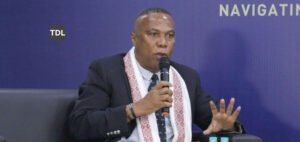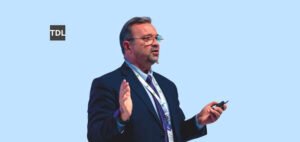One major issue facing the modern workplace is that just a little over 20% of workers globally are fully engaged in their workplace, and even less in the MENA region. Despite the disruption that technology and artificial intelligence bring to sectors, people are always the key to an organization’s success. The people who spark growth need to be empowered, grown, and developed.
Human resources is now a strategic cornerstone rather than only an administrative function. Today, the People professionals create high-performing environments, releases human potential, and prepares workforces for the future. That is, leaders who believe their job is to change lives and build futures, not just implement policies.
The Making of a People Champion
Khaji Kushumbayev’s career in human resources began with familial influences. His mother sparked his interest in human motivation and behaviour. His father was a living example of selfless dedication to others. These factors sowed the seeds for a career focused on support and guidance, where one helps others in organisational settings.
His goal in studying psychology was to learn more about how to help others. He decided to use his “people person” nature to help people in organisations since clinical psychology was not his calling.
Khaji’s HR career started with administrative tasks like phoning, emailing, and pushing papers, but he always knew there was more to the profession. He worked in several verticals of HR function over time, gained knowledge along the way, made mistakes, and learnt from his experiences. He became convinced that learning is accomplished through doing with passion, as a result of this experiential learning.
His numerous certifications and trainings demonstrated his dedication to lifelong learning. He graduated from Harvard Business School Online programs, earned a CIPD People Management Award, and earned his Gallup Strengths Coach certification. He’s been going through this challenging journey with the support of his wife and family. He was dedicated to inspiring others and equipping organisations for the difficulties of the workplace of the future.
Leadership Through Human Connection
Khaji’s leadership philosophy challenges traditional authority concepts. Drawing from Robin Sharma’s “The Leader Who Had No Title”, he believes authentic leadership exists independent of formal positions. According to him, genuine leadership is about fostering a sense of purpose and belonging. It is also about establishing spaces where individuals are inspired to contribute, feel acknowledged and appreciated.
In Employee Experience context, Khaji guides leaders to focus on engagement fundamentals: clarity of expectations, proper tools, utilizing strengths, encouraging growth, listening, connecting to purpose, fostering relationships, providing feedback, and ensuring learning opportunities.
His approach incorporates strengths-based principles, helping leaders amplify what people naturally do best rather than fixing weaknesses. When people operate from strengths, they become more engaged, productive, and fulfilled.
With his team, Khaji brings coaching and mentoring elements. He believes their job is to help team members become their best selves. Witnessing team progress and success brings him genuine joy.
Redefining Employee Engagement
Determining what employee engagement actually means is the first step towards understanding why businesses face difficulties with it. Khaji quotes Gallup when explaining employee engagement as “the involvement and enthusiasm of employees in their work and workplace”. Simply put, it’s the difference between people showing up with energy, passion, and commitment versus just completing tasks without caring about the organization. Employee engagement is often confused with mere motivation or satisfaction, while it’s more about emotional connection to one’s workplace.
The global reality remains concerning, with just over 20% of employees truly engaged. This means most people don’t feel connected to their companies, directly impacting performance, innovation, and retention. Khaji identifies three main struggle points. Firstly, organizations confusing engagement with surface perks like pizza days. Secondly, viewing employee engagement as an “HR project”, when it is the executives who set vision, managers who drive up to 70% of engagement variance, and employees who must take ownership. And lastly, measuring employee engagement without acting, or designing overly complex strategies when simple conversations can spark change.
Khaji emphasizes that there’s no silver bullet for employee engagement. However, organizations dramatically improve their chances when they provide people with a sense of purpose, meaningful development, managers who genuinely care, ongoing conversations, and opportunities to do what they do best every day, continuously. This approach builds not just a workforce that shows up, but one that belongs, grows, and thrives.
Crafting Authentic Employee Experiences
Many organizations confuse Employee Experience with office perks, but it encompasses much more. It involves how people feel throughout their journey, how they communicate with the company, and how quickly their needs are served. True Employee Experience results in people wanting to come to work every day, rather than feeling obligated.
The employee journey doesn’t begin on the first day of work. Sometimes it starts with the initial screening call from the recruitment team and interviews with hiring managers. Many great candidates drop out due to negative interviewing experiences. The journey continues from the moment someone decides to join a company, making onboarding critical. From there, it involves providing clarity, continuous learning, recognition, wellbeing, and building a strong culture every single day until the last day of employment.
For Khaji, a truly positive Employee Experience occurs when people don’t just come to work for a paycheck, but because they belong, grow, and matter. This perspective shifts the focus from transactional employment relationships to meaningful partnerships where both individuals and organizations thrive together.
The Power of Strengths-Based Development
As a Gallup-Certified Strengths Coach, Khaji advocates for a fundamental shift in how individuals and organizations approach development. When discussing strengths, he clarifies that he’s not referring to physical abilities but to talents and natural capabilities, the things people are inherently “strong” at performing.
Traditional development approaches focus on improving skills where people struggle. While this can help avoid failures, it rarely leads to excellence. If someone lacks natural predisposition for something, the best they can typically achieve is mediocrity. However, when people build on their natural talents, there are no limits, which represents the essence of strengths-based development.
When people focus on what they naturally do best, they become more engaged, confident, and energized. Every person possesses a unique set of talents, but many remain unaware of them. Without knowing their strengths, people cannot use them intentionally. As a coach, Khaji helps people discover and understand their talents, then shows them how to develop these natural abilities further.
On an organizational level, he envisions workplaces where everyone knows what they’re good at, understands their colleagues’ strengths, and spends most of their time doing work that energizes them. Instead of competing, team members complement each other’s talents. In such cultures, engagement soars, innovation thrives, and productivity grows. Gallup research demonstrates that people who use their strengths daily are six times more likely to be engaged and three times more likely to report a high quality of life.
Khaji argues that fixing weaknesses drains energy and that excellence usually cannot be built by focusing on what people lack. Organizations that will thrive tomorrow are those that embrace strengths-based leadership, building cultures where people know what they do best and get opportunities to do it every day.
Democratizing Knowledge Through Content Creation
Khaji’s evolution into content creation stemmed from recognizing the value of sharing accumulated career lessons, stories, tools, and practical insights. Rather than keeping this knowledge to himself, he realized it could benefit many more people. His content creation serves a greater purpose of democratizing knowledge, making complex topics simple and relatable, inspiring people to reflect on their strengths and careers, and showing leaders the importance of engagement and culture.
He views content creation as more than just “social media” activity. For him, it represents another channel of coaching, allowing him to reach thousands of people and contribute to preparing them for tomorrow’s workplace. His approach focuses on delivering messages that spark emotion, share knowledge, and provoke thoughts. These are the kinds of insights he wishes he had access to when starting his career.
The fulfilment he derives from content creation comes from knowing that even if his content helps just a few people or organizations grow and become better, the effort proves worthwhile. This perspective demonstrates his commitment to expanding his impact beyond direct coaching relationships to influence broader professional communities.
Preparing for Tomorrow’s Workplace
Khaji‘s vision of tomorrow’s workplace centers on two transformative forces: the expectations of new generations and the rapid rise of technology and artificial intelligence. Work has already changed dramatically from the past when careers were more static. Today’s Generation Z demonstrates far more mobility, leaving organizations quickly if their needs for growth, flexibility, wellbeing, or purpose aren’t met.
The gig economy, remote work options, and reduced stigma around changing jobs have made career mobility more common. Traditional practices like rigid hierarchies or strict review processes may not work effectively for these generations. As Gen Z soon becomes the majority workforce, with Gen Alpha following close behind, leaders must rethink how they engage and maximize their people’s potential.
To remain competitive, organizations must act now by strengthening culture, creating inclusive environments, focusing more on wellbeing, and providing purpose. While the human experience redefines how people work, technology and AI are redefining what people do. Roles continue evolving, with some disappearing and others emerging.
Organizations should embrace AI to automate tasks, personalize learning, and unlock creativity. AI enables faster reskilling and career pivots than ever before. However, adoption must be responsible and ethical, as distinguishing real from AI-generated content grows increasingly difficult.
Successful organizations of tomorrow won’t be those that adopt AI blindly, but those that blend technology with humanity. While technology makes work faster, culture, belonging, and engagement continue to make work meaningful.
Building Trust and Authentic Voice
The job market and workplace dynamics have shifted significantly from when just a salary sufficed. Today, people want much more than paychecks. They expect transparency, psychological safety, growth opportunities, recognition, and a real voice in shaping their work environments. While not everything is possible, companies should make genuine efforts to meet these expectations.
Khaji emphasizes that no silver bullet or quick system builds trust overnight. Trust forms part of culture, and culture takes time to establish. Consistency matters the most. Some effective approaches involve maintaining open, two-way communication between employees and management through regular townhalls, manager one-to-ones, skip-level conversations, and other direct connection opportunities.
Continuous listening proves equally important, extending beyond surveys to include pulse checks, focus groups, and open forums. These simple but intentional practices create channels for employees to speak authentically while providing leaders valuable insights for shaping people strategies that actually matter. Successful execution requires organizations to prioritize employee wellbeing and secure buy-in from everyone involved.
A Simple Yet Profound Mission
When asked to describe his mission in one sentence, Khaji’s response reflects the clarity and authenticity that define his approach: “Helping people.” This simple statement encapsulates years of experience, learning, and dedication to human development. It represents not just a professional objective but a personal commitment to making meaningful differences in people’s lives and organizational cultures.
His mission demonstrates that sometimes the most profound purposes can be expressed in the simplest terms. Through his various roles as HR leader, coach, and content creator, Khaji continues to fulfil this mission by preparing people and organizations for tomorrow’s workplace challenges while creating environments where everyone can grow, lead, and thrive.
Read Also: Shaping the Future of Work




